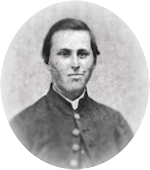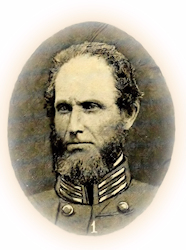October 13th.–Rained all night; clear and cool this morning.
The government publishes nothing from Georgia yet; but it is supposed there is intelligence of an important character in the city, which it would be impolitic to communicate to the enemy.
All still remains quiet below the city. But the curtain is expected to rise on the next act of the tragedy every moment. Gen. Grant probably furloughed many of his men to vote in Pennsylvania and Ohio, on Tuesday last–elections preliminary to the Presidential election–and they have had time to return to their regiments.
If this pause should continue a week or two longer, Gen. Lee would be much strengthened. Every day the farmers, whose details have been revoked, are coming in from the counties; and many of these were in the war in ’61 and ’62–being experienced veterans. Whereas Grant’s recruits, though greater in number, are raw and unskilled.
The Medical Boards have been instructed to put in all men that come before them, capable of bearing arms ten days. One died in the trenches, on the eleventh day, of consumption!
There is a rumor of a fight on our extreme left. It is said Field’s division (C. S.) repulsed three assaults of the enemy. If the battle be still continued (4 P.M. –the wind from the west prevents us from hearing guns), no doubt it is the beginning of a general engagement–decisive, perhaps, of the fate of Richmond.
We have many accounts of evasions of military service, occasioned by the alleged bad faith of the government, and the despotic orders from the Adjutant-General’s office.
And yet Gov. Smith’s certificates for exemption of rich young Justices of the Peace, Commissioners of the (county) Revenue, Deputy Sheriffs, clerks, constables, officers and clerks of banks, still come in daily; and they are “allowed” by the Assistant Secretary of War. Will the poor and friendless fight their battles, and win their independence for them? It may be so; but let not rulers in future wars follow the example! Nothing but the conviction that they are fighting for their families, their sacred altars, and their little property induces thousands of brave Southerners to remain in arms against such fearful odds as are now arrayed against them.
Mr. Kean, the young Chief of the Bureau of War, has come in from “the front,” with a boil on his thigh. He missed the sport of the battle to-day.
Mr. Peck, the agent to purchase supplies for his starving fellow clerks, confesses that he bought 10 barrels of flour and 400 pounds of bacon for himself; 4 barrels of flour for Judge Campbell, Assistant Secretary of War; 4 barrels for Mr. Kean, 1 for Mr. Cohen, and 1 for Mr. Shepherd. This has produced great indignation among the 200 clerks who sent him, and who got but 73 ½ pounds each, and they got 13 pounds of bacon each; while Mr. P. bought for himself 400 pounds.








